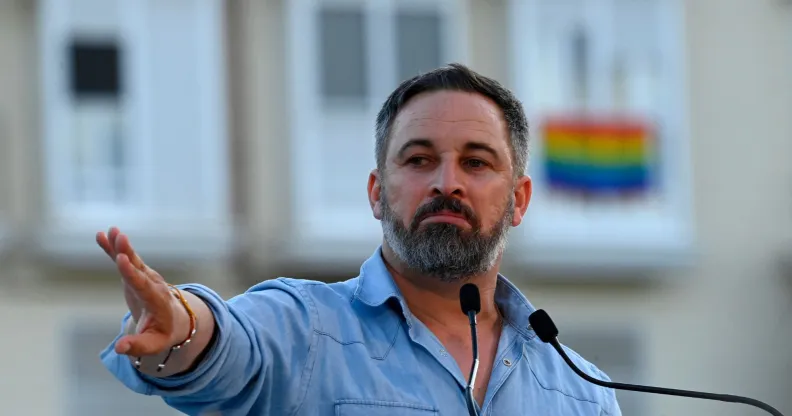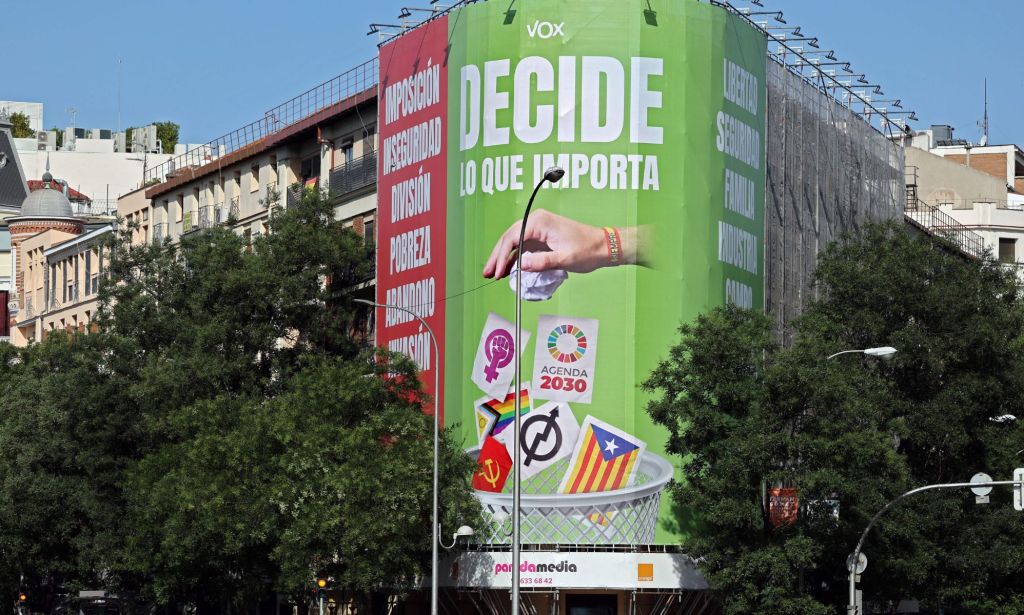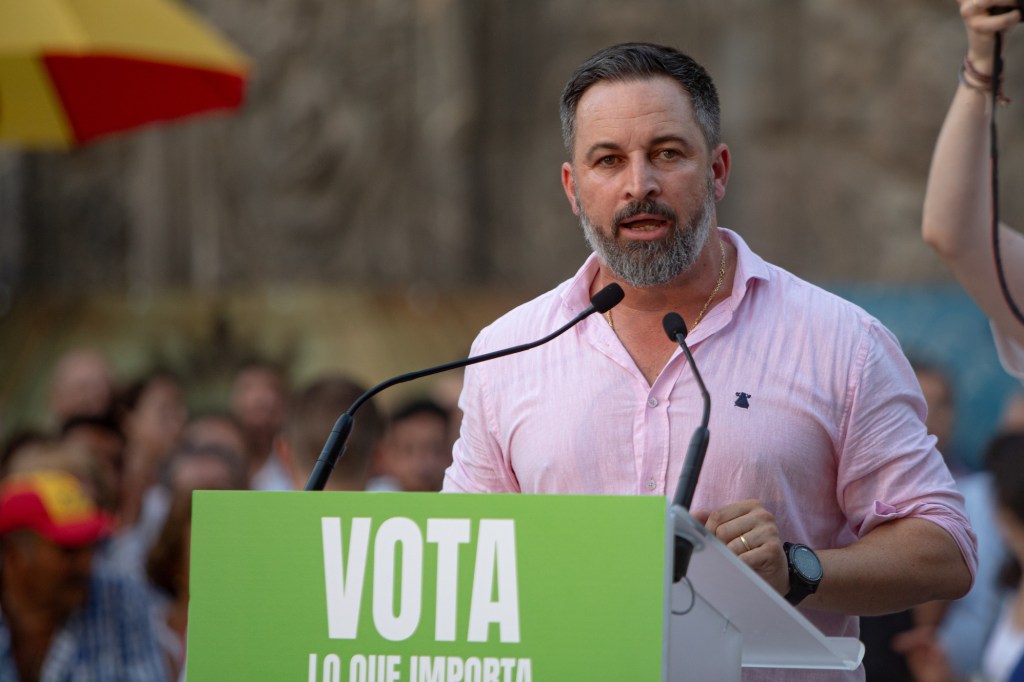Spain’s election could put the far-right in power – with disastrous consequences for LGBTQ+ people

A right-wing coalition in Spain could put far-right party Vox – led by Santiago Abascal – into power. (Getty)
Spain’s general election could signal a major upheaval for the LGBTQ+ community, with polls indicating the European nation could swing to the right for the first time in decades.
Spain has been a shining beacon for LGBTQ+ rights and liberal democracy in recent years, bringing forward key protections for queer people in the country.
But a snap general election on Sunday (23 July) could herald the return of the far-right to power for the first time since the country transitioned to a democracy following the 1975 death of Francisco Franco, the dictator who ruled Spain for nearly 40 years.
Current prime minister Pedro Sánchez’ coalition government, formed from his Spanish Socialist Workers’ Party (PSOE) and the leftist United We Can (Unidas Podemos in Spanish), is facing an uphill battle against his opponent Alberto Núñez Feijóo’s People’s Party (Partido Popular in Spanish, or PP).
Polls indicate that the PP are favourites to win the election, but neither the PP nor the Socialists are projected to win enough votes to gain an overall majority in Spain’s 350-seat parliament and govern alone.
Instead, both would likely rely on support from other parties to form a coalition government. For the conservative PP, this would mean potentially joining forces with Vox, a far-right and staunchly anti-LGBTQ+ party, spelling potential disaster for the queer community.
There’s a lot at stake for the queer community if the right-wing wins in Spain.
Spain was due to hold a general election by the end of the year, but Sanchez, who has led Spain since 2018, called the snap election after his party suffered heavy losses to the PP in local and regional elections back in May.
Pre-election day opinion polls showed the PP in the lead over the PSOE, but still short of an outright majority without Vox’s support, according to Reuters. Even then, both the PP and Vox could still fall short of the parliamentary seats needed to form a right-wing coalition.
Under Spain’s current government, new laws have been introduced that benefit LGBTQ+ people, like protecting queer people from conversion therapy and intersex youth from medically unnecessary genital surgery.
In February, Spain passed pioneering legislation allowing trans people over 16 to change their gender on official documents without proof of hormonal treatments or a diagnosis of gender dysphoria.
Additionally, the law also allows trans youth over 14 to change their legal gender marker with parental approval.
Both Vox and the PP have vowed to take action against the pro-trans measure.

Feijóo said he would abolish the self-ID law if he wins the premiership, justifying his stance by saying it shouldn’t be “easier to legally change your gender than it is to get your driver’s licence”. In its place, the PP leader said he would introduce new legislation to “regulate” trans rights.
If elected, Feijóo has also promised to eliminate the Ministry of Equality, saying “we aren’t here for that.”
Vox leader Santiago Abascal and his far-right party have denounced the pro-trans legislation, claiming the law ‘eliminates’ women and endangers women’s rights. The party also said sweeping pro-LGBTQ+ legislation, which included the self-ID measure, introduced “state interference in areas that should remain strictly personal”.
Vox made headlines in May after the far-right party hung a banner in Madrid that depicted a hand dropping symbols representing feminism, communism, environmental programmes and LGBTQ+ rights into a rubbish bin.

The far-right party also believes only marriage between men and women is “natural” and would also bar queer couples from adopting. Vox has also banned LGBTQ+ Pride flags from being flown from public buildings in cities where it has power.
The new PP-Vox leadership in Valdemorillo, a small town near Madrid, cancelled a theatrical adaptation of Virginia Woolf’s novel Orlando – in which the titular character changes gender – in June. The theatre company director called the move an ‘ideological veto’ by the PP-Vox council.
If Spain swings to the right, it will follow other European nations that have seen a rise in right-wing politics.
A PP-Vox coalition government is unlikely to follow a straightforward path as the parties share power, but it would mean another European country has moved firmly to the right.
It’s a trend seen in recent years across Italy, Finland, Sweden, Poland and Hungary.
Vox is ideologically very similar to Italian prime minister Giorgia Meloni’s Brothers of Italy (Fratelli d’Italia). During a Vox rally, Meloni gave the far-right party’s campaign her approval and recorded a video where she said it’s “crucial that a conservative, patriotic alternative be established” in Spain.
Meloni has previously spoken at other Vox rallies. In one speech, she declared “no to the LGBT lobby” and “no to gender ideology”.

Vox has cultivated strong ties with other European far-right, national groups and even organised a two-day summit in 2022 attended by Hungarian prime minister Viktor Orbán and far-right French politician Marine Le Pen.
The rise of an anti-LGBTQ+ government is concerning as discrimination against queer people remains an issue in Spain.
Spain ranks fourth on the 2023 list of Europe’s most pro-LGBTQ+ countries, compiled by advocacy group ILGA-Europe. The ranking came after Spain introduced its new self-determination law for trans people, banned genital mutilations on intersex minors, prohibited conversion therapy and outlawed anti-LGBTQ+ discrimination.
Additionally, Spain has consistently appeared on lists of LGBTQ+ friendly countries.
Despite these moves forward, hate crime against the LGBTQ+ community continues to be a serious issue in Spain. The Ministry of Interior documented a record number of 466 anti-LGBTQ+ hate crimes in 2021 – a 68 per cent increase from the reported hate crimes against queer people in 2020 (277).

In 2021, 24-year-old nursing assistant Samuel Luiz was brutally beaten to death in A Coruña, a town in the northwest region of Galicia, and several witnesses said the crime was motivated by homophobia.
The hateful attack led to country-wide demonstrations with people taking to the streets, chanting slogans, waving placards and holding rainbow-coloured flags in his memory and in defence of the queer community.

